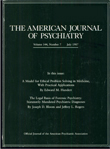Gabapentin as a Potential Treatment for Anxiety Disorders
Mr. A was a 40-year-old attorney with a 20-year history of panic disorder and a past history of alcohol dependence. He had therapeutic trials of sertraline, paroxetine, and desipramine of adequate dose and duration without significant improvement in panic frequency. Taking no medication at evaluation, Mr. A was having daily panic attacks (one or two per day) with limited phobic avoidance. Treatment was initiated with gabapentin, 100 mg/day, and titrated up over 2 weeks to 300 mg t.i.d. During the first week, Mr. A began to experience a gradual reduction in panic frequency, anticipatory anxiety, and sleep disturbance. By week 5, he was panic free with a reduction in phobic avoidance. This benefit persisted to 4-month follow-up.
Ms. B was a 36-year-old woman with a history of panic disorder with limited phobic avoidance since adolescence; in addition, she had a history of recurrent major depression, past alcohol abuse, and mixed character pathology distinguished by marked irritability. She had trials with numerous antidepressants, mood stabilizers, and benzodiazepines, which were either intolerable or modestly successful. A trial with valproate, up to 1000 mg/day, led to notable improvement in panic attacks and decrease in irritability, but the valproate was discontinued because of marked weight gain. Gabapentin, 100 mg t.i.d., was added to her current regimen of fluoxetine, 60 mg/day, and alprazolam, 5 mg/day, and titrated up to 1200 mg/day but was later reduced to 400 mg b.i.d. because of sedation. Ms. B experienced marked reduction in her panic frequency and substantial improvement in irritability and depressive symptoms. This improvement persisted over 6 months while Ms. B continued on a regimen of gabapentin along with her other concurrent medications.
Mr. C was a 54-year-old man with a history of generalized anxiety disorder dating back to childhood and intermittent checking rituals not fully satisfying the criteria for obsessive-compulsive disorder. Over the years, Mr. C had numerous trials with tricyclics and selective serotonin reuptake inhibitors of adequate dose and duration without significant improvement. He derived moderate benefit from diazepam, up to 30 mg/day, but was not able to tolerate higher doses because of sedation. Treatment was initiated with gabapentin, 100 mg t.i.d. Over a 2-week period, Mr. C experienced marked improvement in generalized symptoms of worry and autonomic arousal. This improvement was sustained at 3-month follow-up, and the diazepam was reduced to 10 mg/day. There was no change in his checking rituals.
Ms. D was a 52-year-old woman with attention deficit hyperactivity disorder (ADHD), generalized anxiety, and major depressive disorder, recurrent type. Her ADHD and depression had been effectively treated with dexedrine, 5 mg p.o. t.i.d.; however, she was intolerant of or unresponsive to multiple trials of antidepressants, benzodiazepines, and buspirone for treatment of her anxiety. A trial of gaba~pentin, titrated up to 100 mg p.o. b.i.d., was initiated, resulting in marked improvement in her anxiety and reduction in her intermittent use of alcohol to self-medicate. Gabapentin also reduced the overstimulation she occasionally experienced with dexedrine. Benefit persisted on this regimen at 3-month follow-up.
References
Information & Authors
Information
Published In
History
Authors
Metrics & Citations
Metrics
Citations
Export Citations
If you have the appropriate software installed, you can download article citation data to the citation manager of your choice. Simply select your manager software from the list below and click Download.
For more information or tips please see 'Downloading to a citation manager' in the Help menu.
View Options
View options
PDF/EPUB
View PDF/EPUBGet Access
Login options
Already a subscriber? Access your subscription through your login credentials or your institution for full access to this article.
Personal login Institutional Login Open Athens loginNot a subscriber?
PsychiatryOnline subscription options offer access to the DSM-5-TR® library, books, journals, CME, and patient resources. This all-in-one virtual library provides psychiatrists and mental health professionals with key resources for diagnosis, treatment, research, and professional development.
Need more help? PsychiatryOnline Customer Service may be reached by emailing [email protected] or by calling 800-368-5777 (in the U.S.) or 703-907-7322 (outside the U.S.).

